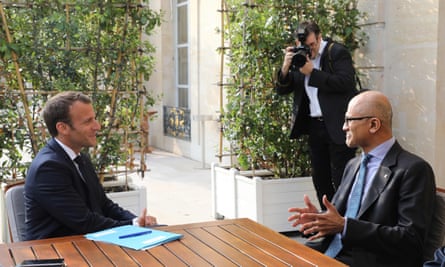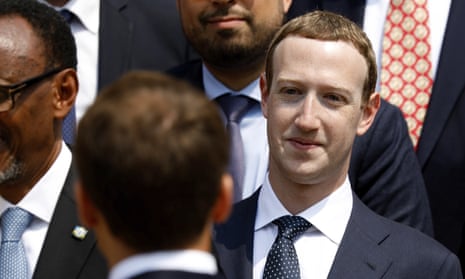The French president Emmanuel Macron has warned a gathering of global tech bosses – including Facebook’s Mark Zuckerberg – that they cannot ride the coattails of the digital economy without giving back to society.
Macron told key tech figures at the Elysée palace on Wednesday that they could not just be “free riding” without taking into account the common good. He called on them to help improve “social situations, inequalities, climate change.”
“It is not possible just to have free-riding on one side, when you make a good business,” the French president said.
He joked: “There is no free lunch” and added that he wanted “commitments”.
Fresh from apologising to European lawmakers in Brussels, Zuckerberg held an hour of talks with Macron in which his company’s tax policies were believed to be among key topics discussed.
Macron, who has long sought to boost technology investment as Paris tries to catch up with London, had invited about 60 key figures from the tech world to an event at the Élysée Palace, including Zuckerberg, Uber’s Dara Khosrowshahi and Microsoft’s Satya Nadella. Macron, 40, who likes to style himself as a champion of the digital economy, will then appear at Paris’s technology fair, VivaTech, which opens on Thursday.
Zuckerberg is currently on a Facebook apology tour after the Observer reported that the personal data of tens of millions of people was harvested and shared with the political consultancy Cambridge Analytica. Facebook admitted that the data of 87 million users may have been improperly shared, including that of 1 million users in the UK.
The Facebook founder told MEPs at the European parliament there would be no repeat of the Cambridge Analytica data scandal and fielded accusations that his company had too much power on Tuesday. At the Élysée Palace on Wednesday, Zuckerberg was thought to have had to discuss tax issues as France is trying to make major US internet companies pay more tax.
Facebook, along with Google, Apple and Amazon, is in the sights of Macron and some other EU leaders over the use of low-tax countries such as Ireland to reduce corporate tax to nominal levels.

Macron’s office said he was seeking a frank exchange about business and accountability. The French president “is looking to start a dialogue” with tech bosses “to have discussions that will sometimes be frank and direct, to talk about regulation and international governance”, an official told AFP.
But the meeting is also part of Macron’s drive to woo tech figures in an attempt to increase digital investment and jobs in France, namely in the area of artificial intelligence.
Issues up for discussion with Zuckerberg and others included data protection, fighting hate speech and the battle against fake news. The French government is preparing legislation to ban fake news online during election periods, including new rules for websites to provide more transparency about sponsored content.
But Macron is also under pressure to make good on his election campaign promise to ensure US internet companies pay a fair amount of tax.
Tech multinationals have come under fire in Europe for using complex fiscal arrangements to declare profits in countries with the lowest tax rates, even when they are earned elsewhere in the EU.
During last year’s French presidential election campaign, Macron argued that these low tax rates were a source of resentment about globalisation and unfair for European companies.
The European commission wants big tech companies to pay a 3% digital tax, to put them on a level-playing field with their bricks-and-mortar rivals. But the plans are already facing strong opposition from some countries, including Ireland.
